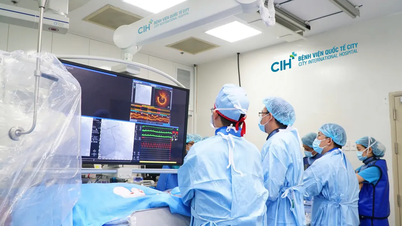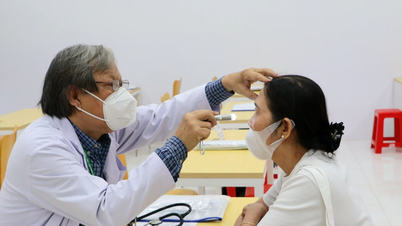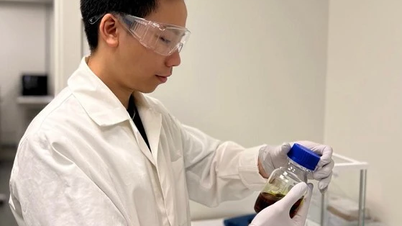Healthy parents do not mean healthy children.
She wrote: “On the day we got married, there was also advice that both husband and wife should have a premarital health check-up and genetic testing to avoid unfortunate consequences for future generations. However, at that time, because we did not understand much about the importance of premarital health check-ups and thought that if both of us were healthy, how could we give birth to children with genetic diseases from their parents, we ignored it. After marriage, we gave birth to a normal son, but his health was not as good as his peers and we simply thought that when he grew up, he would definitely be healthy, so we did not take him for any check-ups or tests.
Suddenly, at the age of 42, my husband, who had been very healthy since childhood and had never been to the hospital, noticed that his belly was getting bigger and his skin was getting darker. At first, my husband thought that his big belly was due to his job, which required him to be out in the sun and drink a lot of alcohol and beer. He was so busy with work that when he felt too tired and lifeless, he went to the doctor and discovered that his heart and liver had severe cirrhosis due to iron overload, and he was facing the risk of death. It was even more painful to know that this was one of the complications of Thalassemia, which my husband carried the gene for but was not detected and treated with iron chelation early.
When we took our child for testing, it turned out that he also had the same genes as his father. I felt heartbroken because he would have to be treated for the rest of his life, but I was comforted that I knew about his illness so I could treat him early. I learned that this disease is completely preventable, so after reading the article “Premarital genetic testing: So that parents do not regret “giving” their children a “sad gift”, I decided to write this letter to the Editorial Board, hoping that from my husband and I’s case, many people will know how to make appropriate choices when getting married, to have healthy children and grandchildren.”
The story of the wife who sent a letter to the Editorial Office is also the story of many couples today. And their sadness also leaves a lot of sadness in the hearts of doctors at the Hanoi Forensic Center every time they have the opportunity to witness it. Forensic examiner Hoang Thi Thu Ha, working at the DNA Examination Department, said that before getting married, couples often spend a lot of time preparing for the wedding and honeymoon. However, they easily ignore a very necessary thing, which is to equip themselves with knowledge to build a happy family with healthy children from their genetic heritage.
“The genome of each of us contains about 3.2 billion nucleotides (denoted by the letters A, T, G, C). When this gene sequence is faulty at important points, it can lead to diseases or health problems. In many cases, people carrying a recessive gene do not manifest the disease. However, if two people carrying the recessive gene get married, the possibility of having a child with the disease will increase significantly. For example, for diseases such as cystic fibrosis, Thalassemia, Tay-Sachs (a rare neurodegenerative disease) ..., if both parents are healthy but carry the same disease gene, the possibility of having a child with the disease in each birth is 25%, 50% is the person carrying the gene and only 25% is the child completely healthy", according to appraiser Thu Ha.
Equip yourself with knowledge to have healthy children from your genetic makeup.
According to expert Thu Ha, it is very necessary for a couple to be equipped with the knowledge to build a happy family with healthy children from their genetic heritage. To have this knowledge, couples need to go to a medical facility for consultation and premarital genetic testing.
“In fact, in some countries such as Saudi Arabia, Iran, etc., where genetic testing is a mandatory procedure before marriage, the rate of children born with serious genetic diseases has decreased significantly. In particular, in the period from 2004 to 2009, the rate of children born with β-thalassemia (beta thalassemia is a genetic anemia) in Saudi Arabia decreased by 60%. This shows the clear effectiveness of premarital genetic testing,” said appraiser Thu Ha.
According to the reporter's research, many young people currently have an incorrect view of premarital genetic testing, that this test is to find out the genetic disease of the other person. With the concern that if the other person knows that they carry the disease gene, will they still want to marry them or not. But in fact, premarital genetic testing is to better understand each person's genetic capital, from which to have an appropriate action plan.
“When the test results show that one or both people are carriers of a disease gene, it does not mean that they cannot have healthy children. Instead, they will have many options such as: in-depth genetic counseling to understand the level of risk and how to handle it; using in vitro fertilization combined with embryo genetic diagnosis (PGT-M) to choose embryos that do not carry the disease gene; thorough prenatal screening if the pregnancy is natural; considering donating sperm or eggs if both people carry a gene that can cause serious illness. These decisions are accompanied and guided by genetic specialists,” advised Thu Ha.
Before marriage, premarital genetic testing is a responsible preparation for parenthood. (Illustration: ST) |
One of the reasons why couples hesitate to get premarital health check-ups and genetic testing is the cost. It is known that genetic testing can cost from a few million to tens of millions of VND. However, compared to the cost of caring for a child with a genetic disease throughout life, including medical expenses, medication, hospitalization and mental impact, this initial investment is completely worth it. Not to mention the mental pressure and risk of family breakdown caused by the disease. Choosing premarital genetic testing is not only a responsible act towards yourself and your partner, but also a humane decision towards future generations.
Changing the way we prepare for parenthood
There is also an opinion that when parents have a completely normal premarital examination, there is still a possibility of having a child with a genetic disease, although it is rare. The reporter asked: "So when the premarital genetic test results show that the two people do not carry mutations in the surveyed gene regions, can we be absolutely assured?" to Ms. Nguyen Thi Ngoc Yen - Director of the Hanoi Forensic Center.
According to Ms. Yen, there are two main reasons why a child can still have a genetic disease even though the parents are completely healthy and the test results do not detect abnormalities. Firstly, there are newly arising mutations (de novo). These are errors that occur randomly during the process of creating sperm, eggs or in the early stages of the embryo. Down syndrome is a typical example, if due to a chromosome division disorder, the fetus has an extra copy of chromosome 21. Such mutations cannot be predicted by conventional premarital tests.
Second, rare genetic diseases are not included in common testing packages. In fact, each test package only examines some of the most common diseases in the community. Rare or geographically specific diseases may be missed. For example, spinal muscular atrophy (SMA) caused by mutations in the SMN1 gene is the leading cause of genetic death in infants, but is not always tested for unless specifically requested.
Therefore, even if the premarital test results are normal, couples still need to fully perform pregnancy monitoring steps such as: trimester screening, morphological ultrasound, if possible, should do non-invasive testing (NIPT) at the 10th week) and when there are signs of suspicion, amniocentesis or chorionic villus sampling (CVS - is a technique of taking a sample of the chorionic membrane surrounding the chorionic villus to analyze chromosomal abnormalities causing Down syndrome or some other genetic diseases in the fetus) to screen for genetic or structural abnormalities, consult a geneticist if there is a family history or abnormal results.
“Premarital genetic testing is not a luxury. It is a responsible preparation for parenthood, an investment in family happiness, and a way to prevent avoidable pain. Although it cannot completely eliminate all risks, this test still helps significantly reduce the possibility of having children with serious genetic diseases. Men and women cannot change the genes they carry, but they can completely change the way they prepare for parenthood. In the context of increasing medical costs and increasingly clear understanding of genes, proactive premarital genetic testing is the right choice not only for today, but also for the future of children and families,” Ms. Yen emphasized.
Xuan Hoa - Tuan Anh
Source: https://baophapluat.vn/xet-nghiem-gen-tien-hon-nhan-quyet-dinh-nhan-van-voi-the-he-tuong-lai-post546034.html



![[Photo] Prime Minister Pham Minh Chinh holds talks with Prime Minister of the Kingdom of Thailand Paetongtarn Shinawatra](https://vphoto.vietnam.vn/thumb/1200x675/vietnam/resource/IMAGE/2025/5/16/23b5dd1e595d429491a54e3c1548fb79)


![[Photo] Welcoming ceremony for Prime Minister of the Kingdom of Thailand Paetongtarn Shinawatra on official visit to Vietnam](https://vphoto.vietnam.vn/thumb/1200x675/vietnam/resource/IMAGE/2025/5/16/cdd9e93739c54bb2858d76c3b203b437)



















































































Comment (0)